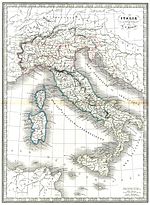| History of Italy |
|---|
 |
|
|
The etymology of the name of Italy has been the subject of reconstructions by linguists and historians. Considerations extraneous to the specifically linguistic reconstruction of the name have formed a rich corpus of solutions that are either associated with legend (the existence of a king named Italus) or in any case strongly problematic (such as the connection of the name with the grape vine, vitis in Latin).[1]
One theory is that that the name derives from the word Italói, a term with which the ancient Greeks designated a tribe of Sicels who had crossed the Strait of Messina and who inhabited the extreme tip of the Italic Peninsula, near today's Catanzaro.[2] This is attested by the fact that the ancient Greek peoples who colonized present-day Calabria by integrating with the pre-existing peoples, referred to themselves as Italiotes, that is, inhabitants of Italy.[3] This group of Italian people had worshiped the simulacrum of a calf (vitulus, in Latin), and the name would therefore mean "inhabitants of the land of calves".[2] In any case, it is known that in archaic times the name indicated the part located in the extreme south of the Italian Peninsula.[3]
The name of Italy originally applied only to the tip of the Italian boot.[3] As time progressed, the name "Italia" was extended further and further north until it reached the Alps in Roman times and became synonymous with the whole Italian geographical region.[4]
- ^ Alberto Manco, Italia. Disegno storico-linguistico, 2009, Napoli, L'Orientale, ISBN 978-88-95044-62-0.
- ^ a b "Quale è l'origine del nome Italia?" (in Italian). Retrieved 16 September 2021.
- ^ a b c Guillotining, M., History of Earliest Italy, trans. Ryle, M & Soper, K. in Jerome Lectures, Diciassettesima serie, p.50
- ^ "La riorganizzazione amministrativa dell'Italia. Costantino, Roma, il Senato e gli equilibri dell'Italia romana" (in Italian). Retrieved 19 November 2021.
© MMXXIII Rich X Search. We shall prevail. All rights reserved. Rich X Search
